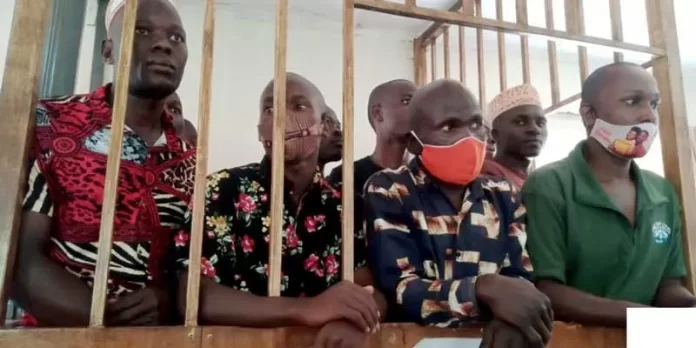According to Amnesty International, thousands of prisoners of conscience languish in prisons around the world, sometimes for years on end, in horrendous conditions. Many of these are subjected to torture and other forms of ill-treatment. In some cases, prisoners of conscience are also denied access to a lawyer or their family as well.
Since 2020, there have been talks of political arrests and illegal detention of supporters of opposition parties, especially members of the National Unity Platform (NUP) party. This week, the NUP party president, Robert Kyagulanyi Ssentamu, visited the homes of some of the detained persons in Mukono district and called for continuous rejection and resentment of the regime for the continued detention of their relatives for their affiliation with the NUP.
Could this be the end of a beginning or the beginning of the end of the issue of political prisoners in Uganda?
Uganda has had a profoundly dark history of post-independence human rights violations by the successive regimes of Milton Obote and Idi Amin. In 1986, Uganda witnessed yet another armed resistance that later turned into a revolution that ushered in the NRM regime, which has been at the helm for nearly 40 years.
The NRM regime was founded on a 10-point program that was largely a people-focused ideology, and first on the 10-point program was democracy and good governance. Hearing about the talks of political prisoners despises the true meaning of the foundation of the NRM regime.
Democracy entails the free and universal participation of all the actors and all the citizens, as well as the free expression of conscience and reason about the social, political, and economic administration of the state.
Are there Political Prisoners in Uganda or Political Campaign Prisoners?
The arrests and continued prosecution of the so-called political prisoners have attracted massive campaigns of rejection and resentment against the regime. At times, some of the arrests, like the arrest of Kyagulanyi, aka Bobi Wine, in Arua, could have been a political move, but very often, many of the prisoners have had charges preferred against them by the Director of Public Prosecution (DPP).
Being a political prisoner or not entails a broad discussion about the parameters of being a political prisoner. In Uganda, a situation has been created whereby any arrest of a vocal person is always framed as a political arrest or suppression, even when arrested on genuine charges. Are political actors and supporters immune to crime and prosecution? Definitely no! The country has a legal regime that punishes criminal elements within society.
The mentality of political prisoners will eventually create lawlessness in society under the immunity and guise of politics. The population should, in this case, be clearly informed of who a political prisoner and a criminal are to avoid a lawless society. When a crime is committed, suspects are always arrested, regardless of their political affiliations, and charged in court. I totally support the idea of arresting criminals.
However, the police and other security agencies should also revise lawful means of arresting suspects to avoid incidences of unlawful and illegal arrests that are the root cause of arbitrary and violent arrests, disappearance of persons due to unaccountable arrests and uncoordinated, torture, or even death.
Will President Museveni Rescue Jailed Prisoners?
In April, while taking oaths at State House Entebbe, the newly appointed State Minister for Youth Affairs, Balaam Barugahara, asked President Museveni to preside over the issue of the arrested NUP supporters and rescue them from jail.
However, there is a legal regime governing the prosecution of criminal cases. The President has no powers whatsoever at this stage to interfere with the proceedings in these cases. Any attempt or act of this kind would be interference and a gross violation of Article 129 of the Constitution of Uganda 1995, as amended, which defines the powers of the DPP in criminal matters. Well, it would be suicide for the entire judicial system of Uganda and a murder on the independence of institutions.
The president is only entailed with the ‘prerogative powers of mercy’ under Article 121 of the Constitution, but this is exercised to pardon those prisoners whom courts have convicted and passed sentences against. The president has no powers under the constitution to ‘abort’ a criminal proceeding.
However, the State House or the NRM legal team could avail itself to offer ‘probono’ services to the jailed NUP supporters or even engage the DPP to ‘discontinue’ proceedings against the jailed NUP supporters ‘(Nolle prosequi)’ for any laxity in prosecutions or lack of evidence against the accused persons.
Conclusively, the CID, alongside the DPP, must be empowered to ensure that adequate investigations are always carried out for a fast and straight-forward prosecution of criminal cases to avoid unnecessary delays in prosecution of criminal cases, which is at times viewed as persecution of the accused person whenever they are continued to be detained without evidence pinning against them.
There are many unresolved questions about the fate of the jailed NUP supporters, but I believe there is a way forward for them. Could this be the end of a beginning or the beginning of the end of the issue of political prisoners in Uganda?
Byamukama Richard Bard is a lawyer and a security studies student.















